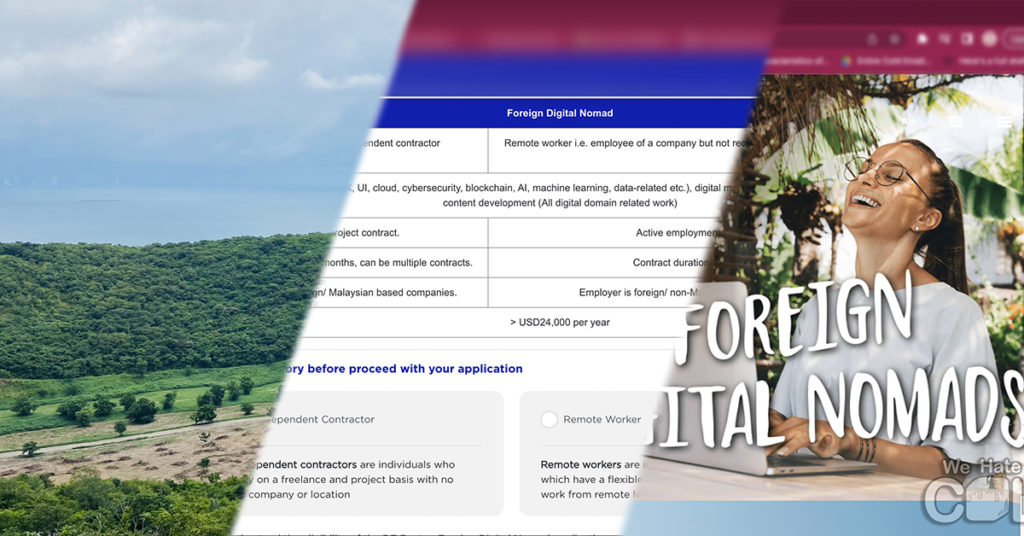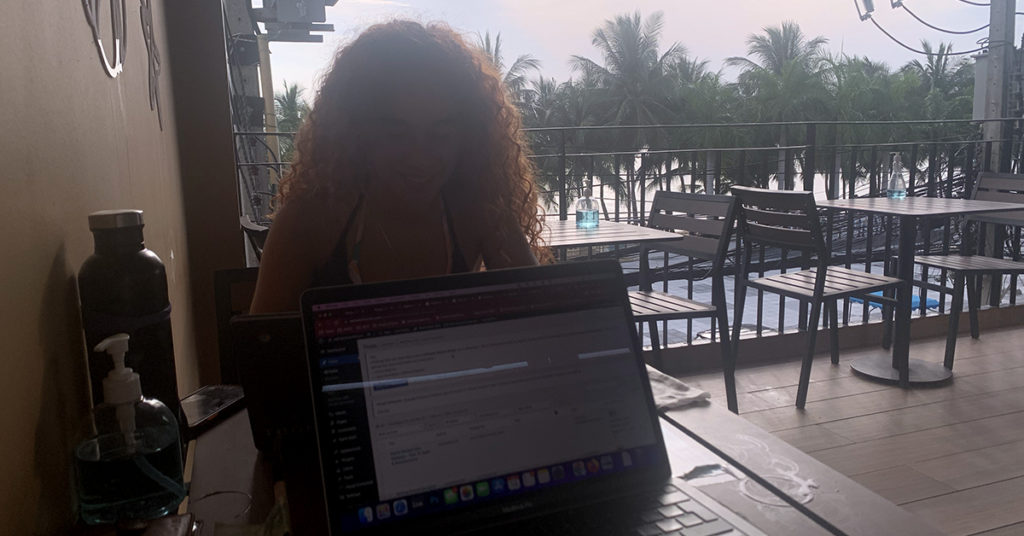If you’re traveling to Asia and you’ll be doing work remotely along the way, it’s likely you’ll need a Visa. Having run into this predicament recently I’ve spent the last week researching digital nomad Visas for our trip to, Asia. In this article, I’ll share what I found. It’s not as cut and dry as you might think!
Some countries allow you to do certain work on a Tourism Visa and others are more strict. So let’s dive in and find out. This article will focus mostly on Southeast Asian countries.
Updates to article:
- September 4th 23 – South Korean “Workcation” Visa (Digital Nomad Visa) set for late 2023 release
- Friday 14th October 22 – LTR Visa Introduced in Thailand (A Visa aimed at Digital Nomads)
- Friday 14th October 22 – Malaysian Digital Nomad Visa Live
- Friday 14th October 22 – Indonesia B112A Visa – Prime Minister Approves Digital Work (not employment)
- 19th October 23 – Indonesian Second Home Visa (Official DN Visa) live!
- Jan 21st – DTV Visa Added
Digital Nomad Visa Asia – Quick List of Links To Apply & Find The Correct Information
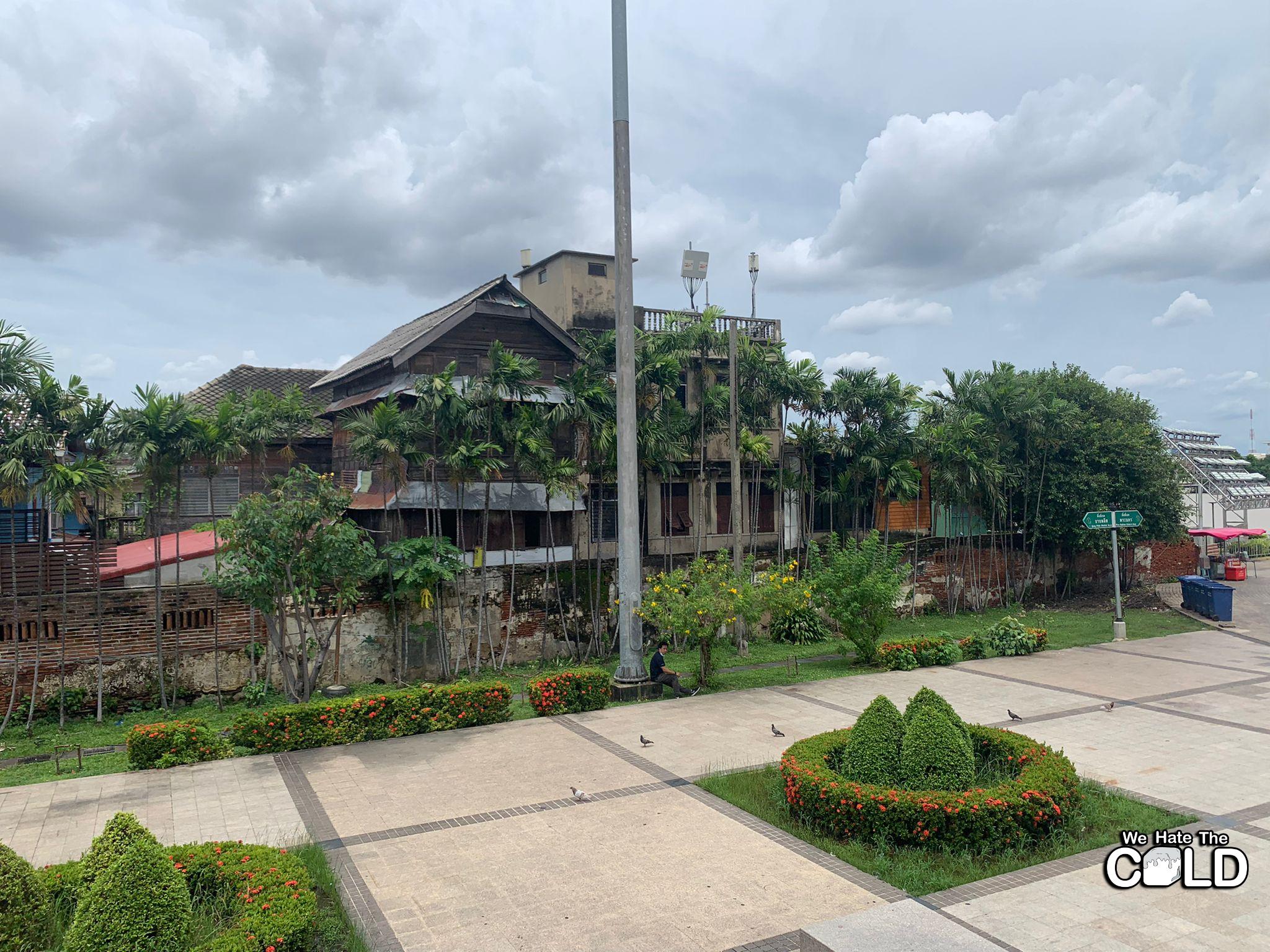
Cambodia
Official Digital Nomad Visa: No
Visa needed for business: Visa E (30 days, $36) – Apply Here
Visa needed for tourism: Visa T (30 days, $36) – Apply Here
Official Government site: evisa.gov.kh
To work in Cambodia as a freelancer you will need a business Visa. The EB Visa covers most expats, freelancers, and volunteers’ needs for their stay in Cambodia. This Visa does not cover you if you want to work for a company in Cambodia. For that, you will need an EG Visa.

If you are working in the country for a company based outside of Cambodia, you must still get an EB Visa. If you are self-employed you can notify Cambodia of your own employment.
You can apply online for an E-Visa to enter Cambodia, or you can get your Visa at the airport. If you are traveling for business or doing any work remotely apply for the E Visa, not the T.
Here are the E Visa Options for Cambodia:
The Visa initially lasts 30 days. You can later extend this for 6-12 months for a cost. The costs are as follows:
| Month Exension | Cost |
|---|---|
| 1 month | $50 |
| 3 months | $80 |
| 6 months | $160 |
| 12 months | $290 |
If you are not conducting work in the territory, you can travel to Cambodia on a Tourism Visa.


China
Official Digital Nomad Visa: No
Visa needed for business: Visa M (30 days, $140)
Visa needed for tourism: Visa L (30 days, $140)
Official government site: mfa.gov.cn/eng/
China isn’t a very popular place for Digital Nomads because:
- You’ll need a VPN to access YouTube, Reddit, Twitter, and most parts of the English-speaking internet
- China has recently cracked down on VPN use, so it’s pretty hard to bypass unless you code
- The security and constant surveillance in China is a big put off
- The air quality is bad and you’ll need to wear a mask in most places
Despite all these problems, you still might want to go to China on a freelance Visa for remote work and to see all the incredible beauty that China has to offer.
Unfortunately, China doesn’t have an official digital nomad visa. It is illegal to work in China remotely without the correct one. To conduct business activities you must get a type M Visa. You additionally need a company to support you in this process for proof. That means, if you’re a self-employed person, you’ll need to set up a company.
To apply for the Visa it is also advised that you apply 1-2 months before your visit so there is time to process the application and so that your stay can be approved.
I recommend you get a Lawyer for this Visa to help you because it is the most difficult Asian Digital Nomad Visa to get.
India
Official Digital Nomad Visa: No
Visa for business: eBusiness Visa (30 days, 1 year, 5 years, each visit 90 days, $197, $593) – Apply Here
Visa for tourism: eTourism Visa (1 year, 5 years, each visit 180 days, $130, $395) – Apply Here
Official government site: indianvisaonline.gov.in
To work in India as a digital nomad, you do not need a special Visa. Provided you don’t enter into an agreement with an Indian organization. If your business is operating outside of India, you can work on it during your stay on a Tourist Visa. If you want to stay longer you will need an eBusiness Visa.

Getting a Tourism Visa is a pretty easy process for most nationalities. However, if you are from the UK (like me), you can’t use the online Visa portal. The Visa process has been outsourced to VFSGlobal and you will have to apply there.
If you are doing any of the following:
- Going to conferences, and business meetings with potential clients, suppliers & business parters
- Providing a service to anyone in India – installing products, maintaining them
- Consulting or providing services to an Indian company during your stay
- Or hiring people for your business
You will need a business Visa. To get one of these, you need to apply online at the E-Visa portal. If you are from the UK you will have to use VFSGlobal.
To apply for a business or tourism visa for India, you must apply 4 days in advance for the application to be processed. However, it’s advised you do this 30 days before, because they can be rejected. You can’t apply any earlier than 30 days before your arrival date in India.
Please ensure to research the government website before applying. Each Visa has a different length of stay and it’s important you know this before applying so you can plan around it.
Indonesia
Official Digital Nomad Visa: Yes (Second Home Visa, 5 year stay)
Visa for business: Business B211A Visa (60 days+, must be sponsored by company, $300) – Apply Here
Visa for tourism: Tourism B211A Visa (30 day stay, can extend to 60, $35 on arrival, $50 single entry, $100 multiple entry) – Apply Here
Official government site: imigrasi.go.id
Digital Nomad Guide To Bali
Indonesia has an official Digital Nomad Visa – the Second Home Visa. This requires proof of $130k USD+ and includes a max stay of 10 years with extensions. This makes the best way digital nomads can work in Bali, the B112A Visa. This allows you to visit and work in Bali for up to 6 months, as confirmed by the Indonesian Prime Minister.
If you want to stay longer than the 30-day period your tourism visa allows, you must get a Business Visa to do this. This is known as the B112a Visa, and you can extend this for up to 180 days of stay in the country. It is a single-entry Visa, meaning you cannot go and come back as you please. You must apply for a B112a Visa each time you intend to leave and come back.
Indonesian Prime Minister has approved digital work on B112a Visa.
Here’s what you need to know about the B112a Visa:
- Cost – $300 (14 business day approval), $390 (7 business day approval)
- Duration of stay – 60 days
- Extensions – extend 2 times allowing 180 days, $230 for each extension
- Means of transport out – must have a confirmed flight or bus journey onward
- Number of entries by plane – single entry
- Number of entries by land or sea – single entry
- Ability to work – able to work digitally, no employment to be taken from Indonesian companies
The Tourism Visa lasts 30 days and you can extend it to 60, leave, then come back to start another application. But, after the 60 days is up you are required to leave and you are not allowed to come back for 90 days.
Many people report this 90-day rule rarely being enforced.
To get the Digital Nomad Visa when it comes out, you will have to have a Tourism Visa. You can either get this on your arrival at the airport, or you can make use of the eVisa portal online.
If you are from an ASEAN country you cannot get the Visa on arrival. Here is the full list of the countries available to get it.
Once the details are released on the Visa, you will need to have the usual, Passport, Passport sized photos, and proof of income outside of Indonesia.
Malaysia
Official Digital Nomad Visa: Yes (Application Opens 1st Oct 22)
Visa for business: None needed, apply for Tourist Visa
Visa for tourism: eVisa (30 days, $4.7), eNTRI (15 days, $4.7) Multiple Entry Visa (must apply in person at embassy) – Apply Here
Official government site: mdec.my
Malaysia has just released its digital nomad Visa. To get it, you need to prove $24,000/year income. It is valid for 6 months after successful application and is valid for multiple entries over a 3-12 month space, with the option to renew for another 12 months. The Digital Nomad Visa costs 1000 MYN, and allows dependents for 500 MYN each.
You can also travel to Malaysia for Business purposes that do not involve paid employment in the country, using a Tourism Visa. If you want to work in Malaysia, you will need an EP Work Permit or a PVP Permit.
For higher performing Digital Nomads, there is additionally a Malaysian tech entrepreneur program.
For this there are 3 tiers:
- New Tech Entrepreneur – 1 year pass, for someone with no track record, but a verified tech business idea. Extension of this visa is subject to 1st year’s performance of startup.
- Experienced Tech Entrepreneur – 5 years pass, someone who has a 2 year successful track record of an established business.
- Tech Investor – 5 year resident pass, must have 10 million MYN and be signed up with Securities Commission Malaysia as a Venture Capitalist
There isn’t much more information on Malaysia, about the Visa you’d need for a long stay. All sources recommend to go to your local Malaysian embassy to apply for other Visas.
The cost for a Tourism Visa is one of the lowest I’ve found so far, coming in at 20 Malaysian Ringgit.
Additionally for British Nationals, you do not need to get a Visa to visit Malaysia. You are able to travel through the country for 3 months without a Visa.
South Korea
Official Digital Nomad Visa: Yes (Workcation Visa, tax 6-35% depending on income, fee depends on country)
Visa for business: Visa F2 (freelance, $160), Many options – please research on Embassy
Visa for tourism: Visa B-2-1 (30 days, non-exempt, $50), Visa B-1 (90 days exempt countries list $0), Visa H-1 (1 year, working holiday, must sign agreement to get South Korean job, $45)
Official government site: visa.go.kr
There is no Digital Nomad Visa for South Korea yet. However, South Korea is working on a specific Visa for Digital Nomads called the “workcation” Visa, which will be available sometime in 2023. This will allow up to 2 years of stay in the country. Currently, it is illegal for remote workers to work in South Korea on a Tourism Visa. To stay in Korea longer as a freelancer, you will need an F2 Visa.
To get the F-2-7 Visa, you need to get 80-120 points on a point system that covers how much income you earn, what your level of University Education is, how proficient you are in the Korean language, and more. It will cost you $160 to apply for this Visa as a US citizen. You can see the points given at each question for the F-2-7 Visa below.
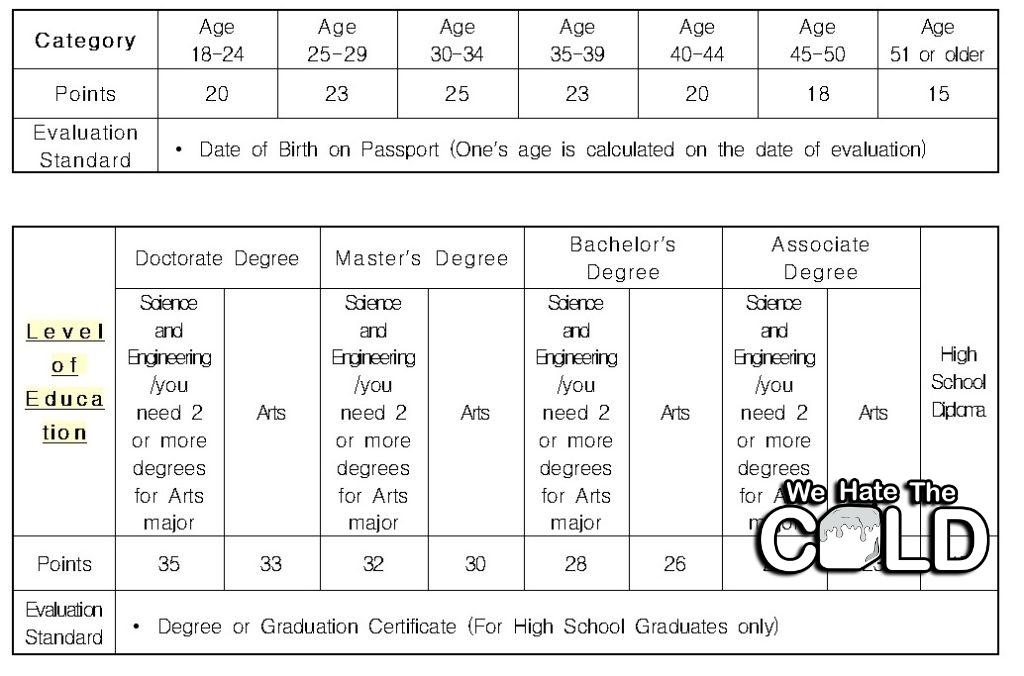
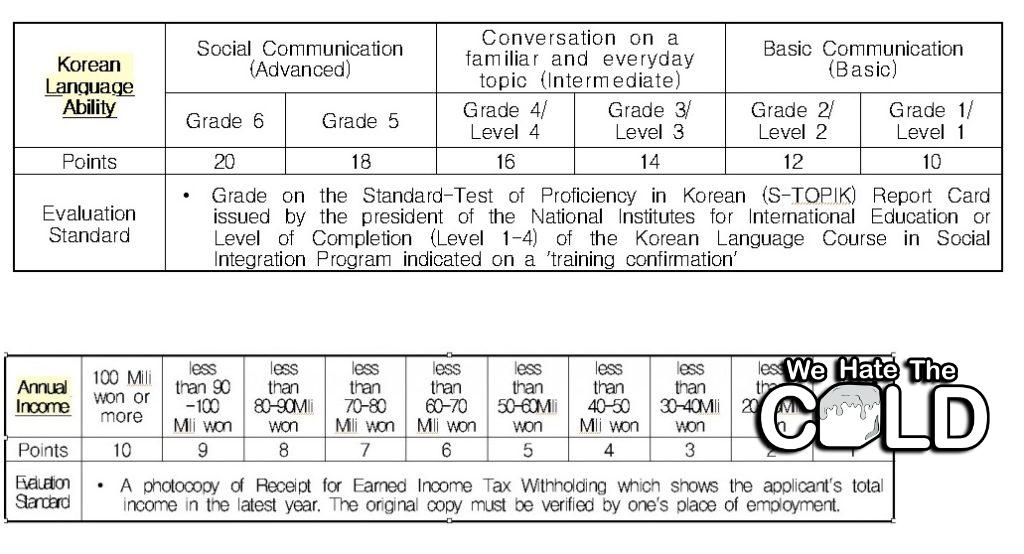

For an easier route into South Korea, many Digital Nomads can make use of the H-1 Visa. This is a working holiday Visa, and to get it, you must sign an agreement that says you are going to get a short-term job in Korea to fund your stay.
Whether the authorities look into this or not is up for debate. However, I would never recommend you get this Visa and don’t follow the rules.
Many Digital Nomads have reported going to Korea using this Visa without problems, but governments can crack down at any point and you could be black listed from the country.
Another option for remote workers is a work permit Visa, which is categorized as Visa Type C.
To get a work permit, you must work for a South Korean company or a company that has a branch located in South Korea. The company you work for can then sponsor you for the Visa.
Furthermore, you could additionally apply for a D-10 Visa. This is a Visa that allows you to look for a job while you are in Korea. However, this Visa has a strict application process and you must prove you have the skills to get a job in a South Korean company.
The final Visa that travelers make use of is the E-2 Visa. This is for English teachers and is by far the most popular Visa for Digital Nomads in South Korea, and is the easiest to get. You will need a BA degree and a sponsorship from a company to get this Visa.
Unfortunately, if you’re a freelancer, the F-2 Visa is your only option until South Korea’s Digital Nomad Visa has more information.
However, it has been over a year since they announced it, and there hasn’t been any further progress with releasing it to the public.
Thailand
Official Digital Nomad Visa: Yes (Destination Visa Thailand – 5 years, tax free on foreign income, 17% on skilled workers)
Visa for business: Visa B (90 day single entry, $60, 90 day multiple entry, $140) – Apply Here, Smart Visa (1 year, $270 per year) – Apply Here
Visa for tourism: exempt for 30 days (check country list, increased to 45 days Oct 1st 22 and beyond), Visa TR (60 day, $30)
Official government site: thaievisa.go.th
The Destination Thailand Visa (DTV) is a multiple-entry visa allowing digital nomads and remote workers to stay in Thailand for up to 180 days per entry, valid for 5 years. Visa holders can extend each stay by an additional 180 days. Requirements include minimum savings of ฿500,000 maintained for 3 months and proof of foreign employment. The visa fee ranges from ฿9,835 to ฿38,389. DTV holders can work remotely for non-Thai companies without a work permit and can include their spouse and children under 20 as dependents.
Although this visa looks quite promising to the untrained eye, it may not be the best option for you. I would encourage learning why you shouldn’t get Thailand’s Destination Visa and explore other options such as the popular ED visa.

The Digital Nomad Visa is extremely competitive and is hard to get your hands on. In order to qualify for the Thailand Digital Nomad Visa, you must tick a lot of boxes, which we cover in greater depth in our Thailand Digital Nomad Visa guide.
To apply for the Destination Thailand Visa (DTV) as a digital nomad/business owner, you must meet these requirements:
- Show financial evidence of at least ฿500,000 in a Thai bank account for the last 3 months
- Provide proof of salary/monthly income for the last 6 months
- Submit a foreign employment contract or employment certificate authenticated by your embassy
- Provide a copy of your company’s registration/business license authenticated by your embassy
- Present a professional portfolio showcasing your digital nomad, remote worker, or freelancer status
- Be at least 20 years old if self-supporting
- Have no history of long overstays with Thai immigration
- Be from an eligible passport country (numerous countries across Americas, Asia, Europe, Africa, and Oceania qualify)
If you don’t meet these requirements, you can essentially work on your business while traveling on a Tourism Visa, as long as you already own that business and it earns outside of Thailand’s territory. However, you cannot offer services to Thai people, gain employment for a Thai company, or try to use Thai resources to profit during your stay. For this, you will need a business Visa (Visa B) or a Digital Nomad Visa.
If you are a travel blogger or YouTuber making content solely about Thailand, you must get a business Visa (Visa B), unless Thailand is a small stop as part of a bigger travel plan.
The main rule you need to know is – if what you are doing is taking away work from a Thai person, or that work could be done by a Thai person – then you need to get a Visa. Below I’ve left a few examples to help you understand whether you need a Visa or not.
You can work on the Tourist Visas if:
- You already run a Shopify store or blog even if you have some customers in Thailand
- You are working on an online business that operates outside Thai jurisdiction
- You are coding remotely for a company outside of Thailand
- You are traveling to do business for any company registered outside of Thailand
You can’t work on a Tourism Visa if:
- You have a travel blog or YouTube that makes content solely about Thailand, even if you don’t make money
- You are teaching English online to students
- You are providing a service to a Thai person while in Thailand
- You are creating products using materials from Thailand and shipping them to people
Thailand additionally offers some other Visa programs for talented people who can help to grow the Economy. If you’re a startup, talented individual, investor, or executive of a company, check out the Smart Visa – it’s a very generous program to make use of. You can also use the Long Term Resident visa (more on this in our dedicated article).
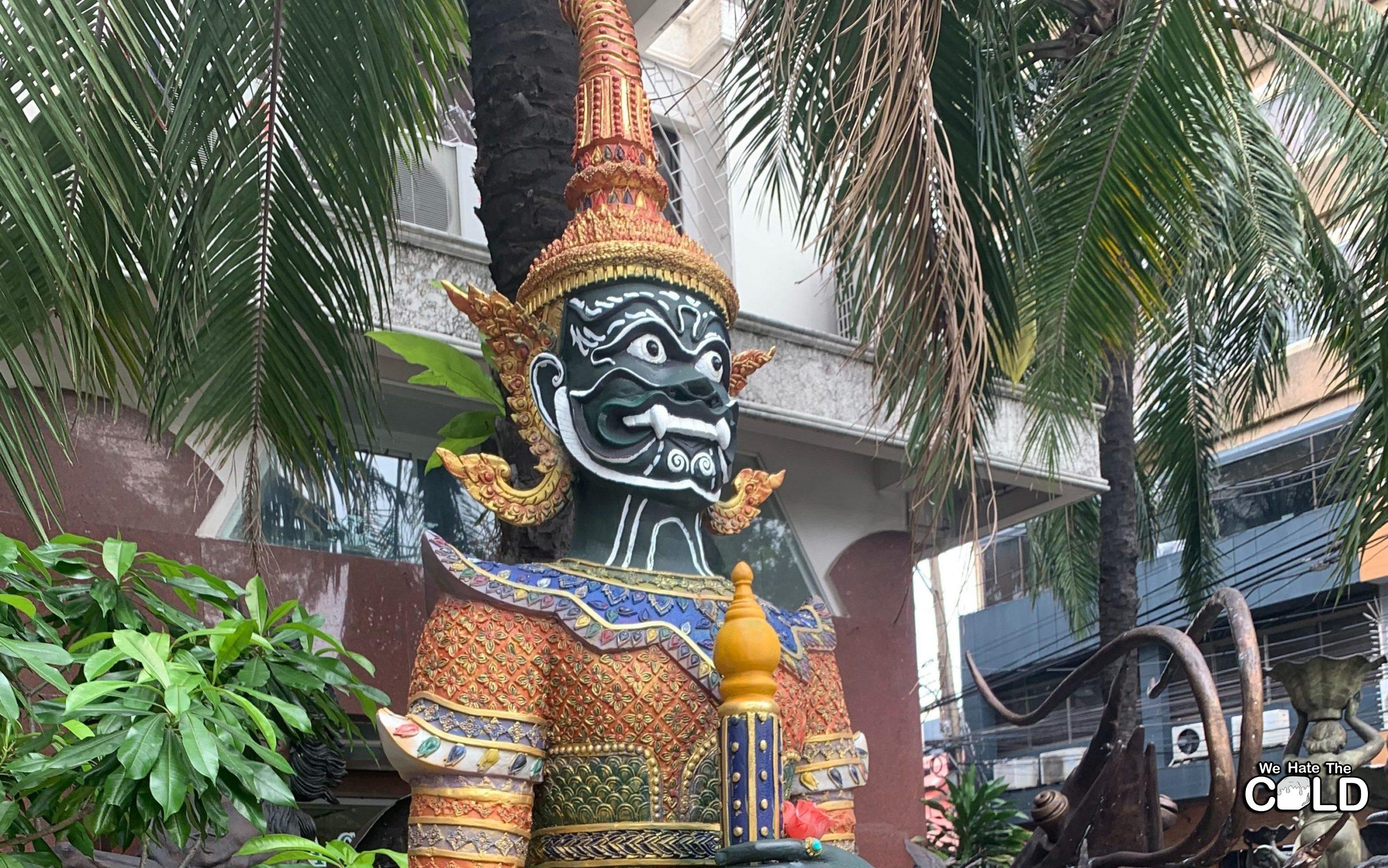
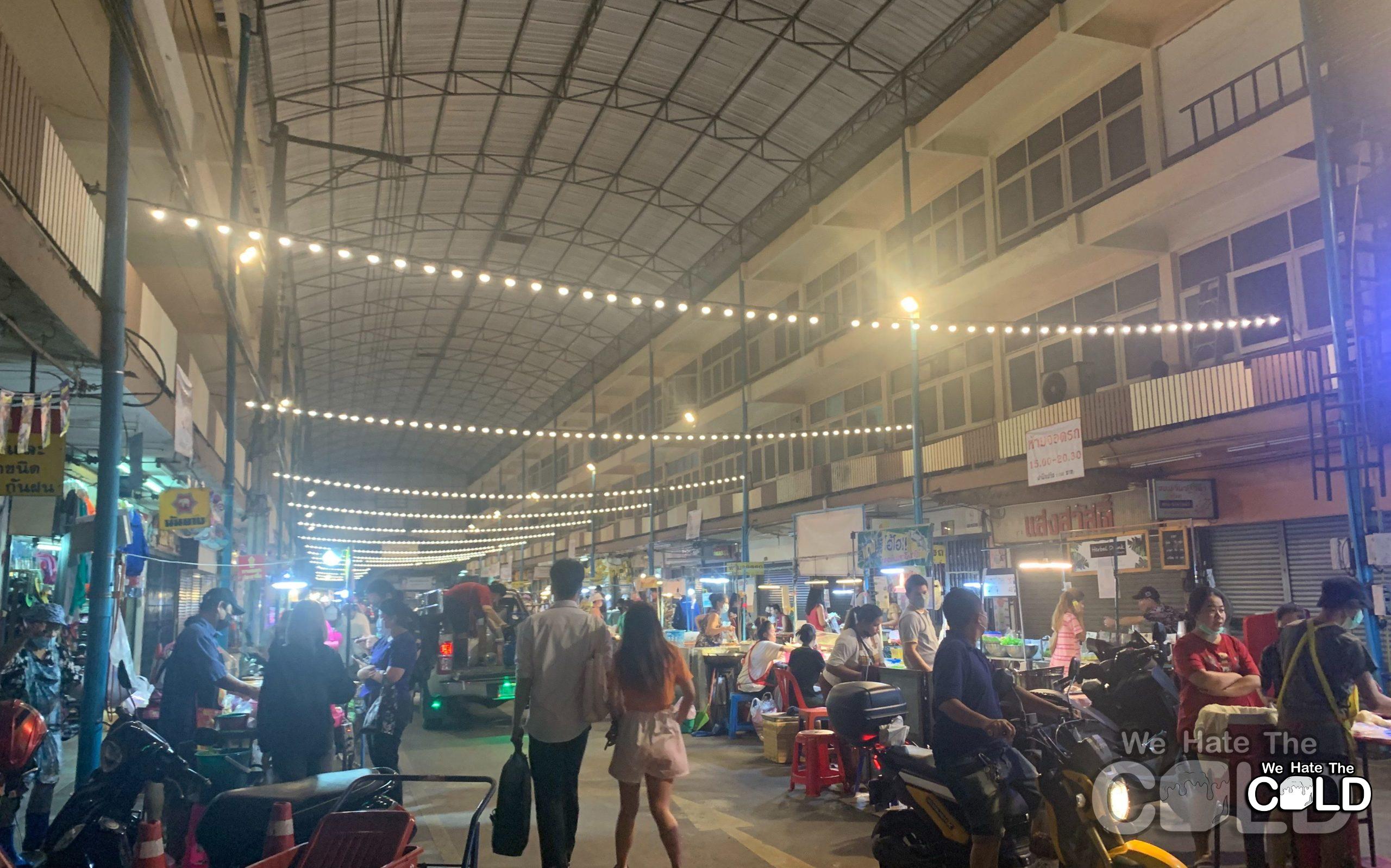
Singapore
Official Digital Nomad Visa: Yes (Workcation Visa, 2 years stay,
Visa for business: Visa B (90 day single entry, $60, 90 day multiple entry, $140) – Apply Here, Smart Visa (1 year, $270 per year) – Apply Here
Visa for tourism: exempt for 30 days (check country list, increased to 45 days Oct 1st 22 and beyond), Visa TR (60 day, $30)
Official government site: thaievisa.go.th
Singapore does not have an offcial Digital Nomad Visa. It is illegal for remote workers to freelance in Singapore on a Tourism Visa, and you must get a work permit. This is hard as you need to be sponsored by a company or you need to set up a LTD Singaporean company to sponsor yourself.
If you are going to Singapore as a self-employed person, it will be difficult to stay as the Singaporean Visa system is set up for company workers.
Almost all of the Visas that allow you to stay have a requirement that you must have a job in Singapore and earn above a certain amount.
High-performing Digital Nomads could make use of the Entre Pass if they are looking to start a company in Singapore, but the requirements are quite hefty, with the company needing to have Venture Capitalists funding it.
There are two other passes for exceptionally high-performing people:
- The PEP Pass – must be an overseas foreign professional with $18,000/month income
- The Expertise Pass – must be an outstanding skilled worker with $30,000/month income, additionally, you must be employed by a new, Singaporean company
Again, you could set up your own Singaporean company and sponsor yourself. However, you need to be a citizen to do this. If you are married to a citizen it is possible to set one up in their name and sponsor yourself, but this is costly.
Most foreigners use the Working Holiday Visa.
For this, you would need to find a job in Singapore and have a company sponsor you. Many foreigners choose this option and then change to a work permit after they have a secure job.
My cousin went this route and landed a job teaching in a Singaporean school.
It’s important to note:
Any overseas income above $2000 you must declare your earnings in Singapore and pay tax on those earnings.
Laos
Official Digital Nomad Visa: No
Visa for business: NI-B2 Visa (1 year, can be extended) – Apply Here
Visa for tourism: T-B3 Visa (30 days, extend to 60) – Get upon arrival in Laos or Apply Here
Official government site: laoevisa.gov.la
Laos doesn’t have a Digital Nomad Visa. You can work in Laos on your business located outside of Laos using the Tourist Visa, which you can only get on arrival or at a consulate. The Tourism Visa fee is $50 and you can apply online.

There is a Business Visa for people conducting business or work in Laos called the NI-B2. To obtain this Visa you must apply online with the relevant information to be accepted.
There are additionally less legal ways of getting a business Visa through Travel Agents. This typically costs $1000-1500 for 1 year Business Visa.
You can theoretically work on a business that earns outside of Laos on the 30 day Tourist Visa, then extend it to the 60 day Tourist Visa, but you must leave after that time. You can enter the country again if you wish, but you will have to pay the Tourism Visa again.
This isn’t entirely legal, so I would never recommend it, but people do it.
Vietnam
Official Digital Nomad Visa: No
Visa for business: Business E-Visa (12 months, must be sponsored by company, $25-$135)
Visa for tourism: Tourism E-Visa (30 day stay, $25) – Apply Here
Official government site: evisa.xuatnhapcanh.gov.vn/en_US
You can work in Vietnam as a Digital Nomad on a Tourist Visa as long as the company you work for is outside of Vietnam. If you are from the list of exempt countries, you can stay for 30 days. If not, you need to get an eVisa from the official website. This costs $25 and lasts 30 days.
To get a business Visa to stay longer, you must be sponsored by a company to do so and that company must be based in Vietnam. This means if you are a Digital Nomad, you will need to set up your own company to sponsor yourself.
Be wary of legal agents who apply for a Business Visa for you. These often use Ghost Companies and recently Vietnam has cracked down on this practice, leaving many blacklisted from the country.
There is no official Digital Nomad Visa for Vietnam.
You can technically work on a Tourism Visa and do Visa runs every 30 days. However, if you want to stay legitimately in the country, it’s best to apply for a Visa extension. For this you will have to seek legal advice, as stated on the official Government page.
Rapid Fire Summary
The Asian countries with official Digital Nomad Visas are:
- Thailand (still developing)
- South Korea (still developing)
- Indonesia (live)
- Malaysia (live 1st October 22)
If you are planning on staying in any country longer than the Tourism Visa allows you to, you must get a proper Visa. Additionally, it is illegal to work on a Tourism Visa in some countries. To avoid being blacklisted from a country, ensure you get the right Visa for your travels using this list as guidance.
Although there are only a few Asian countries that offer official Digital Nomad Visas, it is still possible to live and work in the countries on different Visas. I created this list to research for my own travels and have extensively researched and exhausted every option in South East Asia. I hope it helps you on your travels.
Please leave any questions below and I’ll do my best to answer them.
FAQ
Can I Just Get By On A Tourism Visa As A Digital Nomad?
In some cases yes. In other cases no. If you are not conducting a service in the country, working for a company registered there, exporting goods out of the country, or making videos of it, then you are fine on with a Tourism Visa.
However – Different countries across Asia have varying rules on what is considered work and what isn’t. It’s recommended you research this before going and leave at least 3 weeks to apply for the correct Visa.
For instance, in Thailand, if you are going traveling and already run a Shopify shop or Blog/YouTube that is unrelated to travel content, and you won’t be writing or videoing about Thailand, you do not need a business Visa.
However, if you are a travel blogger or you are conducting any kind of service for a Thai person while you are in Thailand, you must have a business Visa.
This isn’t the case in somewhere like Vietnam, where you can get by on a Tourism Visa, as long as you are not working directly for a Vietnamese company.
I would recommend you check this before using the direct government site for the country you want to visit because Visa laws are constantly changing.
I create these guides to share my real experience of traveling and what it’s like. In a couple of years, this process may have changed.
What If I’m There on Work With A Company Based Outside of The Territory?
Most Visas will allow you to conduct your business meetings and travels on a Tourist Visa if the company you are working for operates outside the region. It’s recommended you properly research this before visiting to ensure that you are ok to travel and conduct your business on a Tourism Visa.
If you are providing a service to someone while you are in the country, that is different and you must get a Visa to state the purpose of your visit.
Which Countries Have A Digital Nomad Visa?
To put it shortly, South Korea, Malaysia, Thailand, and Indonesia are the only countries that have spoken about creating Digital Nomad Visas specifically for nomads. Out of those Malaysia, and Thailand are the only 2 that currently offer a specific Digital Nomad Visa.
For the rest of these Asian countries, you can either use Tourist Visa for short stays, or you will have to apply for a business Visa/work permit to work in the country and make use of the low cost of living.
Please read this whole list, because in some countries, working on a Tourism Visa is illegal and could get you blacklisted. In others it’s fine.
Make sure that you check all of the government sites for the latest information, as these rules are subject to change at any moment. I have just reported what I have found in my travels around Asia. Please use the quick links to check each government site that is relevant for your stay.
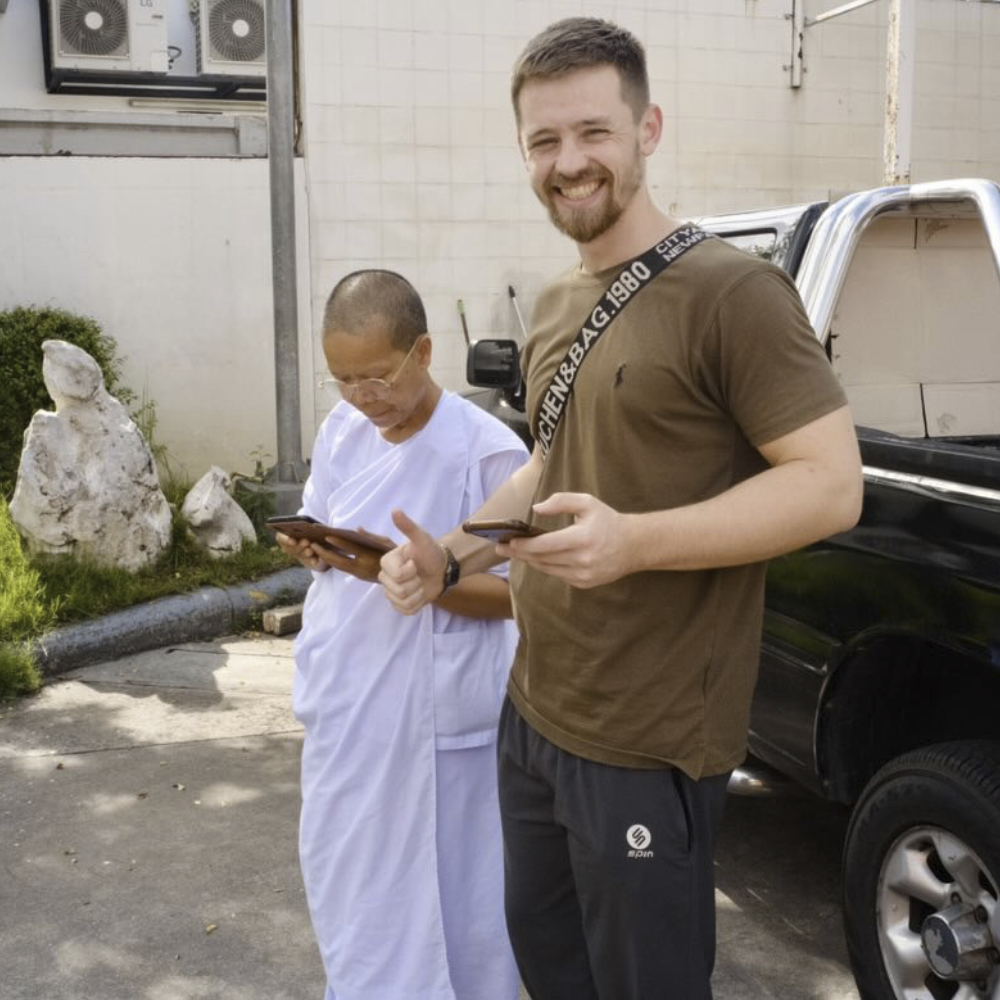
I’m Harry – and I was tired of the same old “10 best places I’ve never been but I’m writing about for some reason” blog posts. So… I’m a young traveller on a mission to travel the world and share my true, unfiltered experience, including all the gristly details. From packing my life into one bag for a year, to traveling Vietnam by motorbike, to sorting out Visas for specific countries – I’ve done it all, am doing it all and only give my advice on things I have done – not regurgitated cr*p from another source *cough* most publications *cough*. So bear with us! This project will take some time to grow, and will take a fair bit of money. But I’m determined to make it the single best source of information about traveling on the internet.
